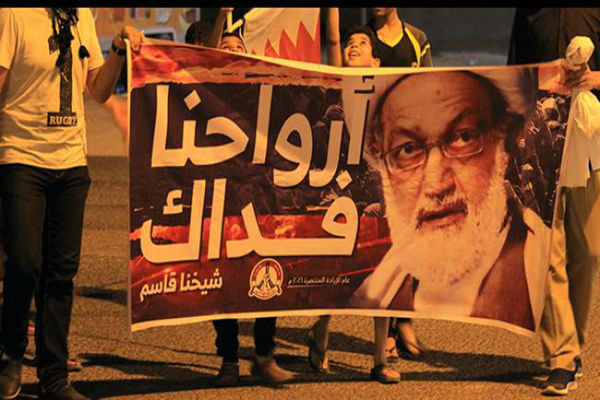In 2011, cruel regime in Manama defied the public uprising of majority Shia population, whose waves of rage would demolish the lush palaces of the minority Al-Khalifa rulers. Since then, after 6 years, the Revolution, as popular sentiments would call it, has been moving forward, with equally intransigent Al-Khalifa regime in its crackdown against the tides of rallying public also present in streets. The crackdown has bought for the regime eternal badge of dishonor, since it has made accomplice the Saudi military who has not spared even the cruelest of means to placate the Revolutionaries. Mass arrests, kidnappings, torture in prisons, and systematic blockade of international observers and denying entrance to country, stripping Shias of their Bahraini nationality, and granting instead nationality to foreigners had all failed in bringing to knee people who have been self-avowed in their path.
In recent month the crackdown took a violent turn when Sheikh Ali Salman, the Secretary-General of al-Wefaq movement received first in primary court a 4-year sentence, which became even cruel and longer (9 years) in court of appeal. Dissolution of al-Wefaq movement and confiscation of its properties followed. Nabeel Rajab, Head of Bahrain Human Rights Committee was arrested and transferred to a solitary confinement. Within a week of all these, Maryam Abdulhadi al-Khawaja, also a human rights activist, was released from prison, but was sent to exile. This was not the end of the measures by Manama. It even dared to such escapades as stripping the nationality of popular Shia cleric Sheikh Issa Qassim, which came as rather a surprise to the public of the region, since Sheikh Qassim had been known for moderation and reformism, and who rejected violence. However, Al-Khalifa regime was brazen enough to use pretexts ludicrous as his participation in provocative acts and thus threatening national security of the regime.
Sheikh Issa Qassim had been inviting the public to restraint and peaceful rallies during recent years in his addresses. He has carved up a huge following among the Shias for his moderation. The public has alarmed the regime as crossing their Rubicon by stripping nationality of the cleric. The event collected large crowds before the house of the sheikh, and angry protestors participated in a political sitting to condemn the act by the government.
Freedom and Democracy Movement issued a statement where it declared that the Al-Khalifa regime’s measure about trial of Sheikh Qassim borders the insanity; “the regime should know well that playing with the redlines of the public will jeopardize the regime’s existence; trial of the sheikh provides harder options for Bahraini followers of the sheikh in protecting their religious leader,” said the statement. The ‘hard options’ in the statement includes in the most probability the armed conflict; what is understood from the situation on the ground in Bahrain, is that the regime had worked to deflect the Revolution from its purely peaceful path into bare violence, an option which would rejoice the regime the most and leaves the regime free to choose from among the inventory of its cruel measures to punish the public.
Redlines crossed, however, now, has implications to the world of Islam at large. Revolutionaries in Bahrain thus are seen as prevent a trial by the regime of their religious leaders at best and if their attempts failed, to descent into chaos of military option at worst. Spokesperson of Issa Qassim however believed that ‘peaceful means’ still constitutes a strategic option for people in Bahrain; to keep the status quo however hinges upon a few conditions to meet, one such condition being Shiekh Issa Qassim remaining among his followers and his leading the path to Revolution. “If he opts for peaceful retreat to his ivory tower, no guarantee will be available that his followers will remain with peaceful demonstrations as a guiding national framework,” he added.
SH/3725139

























Your Comment